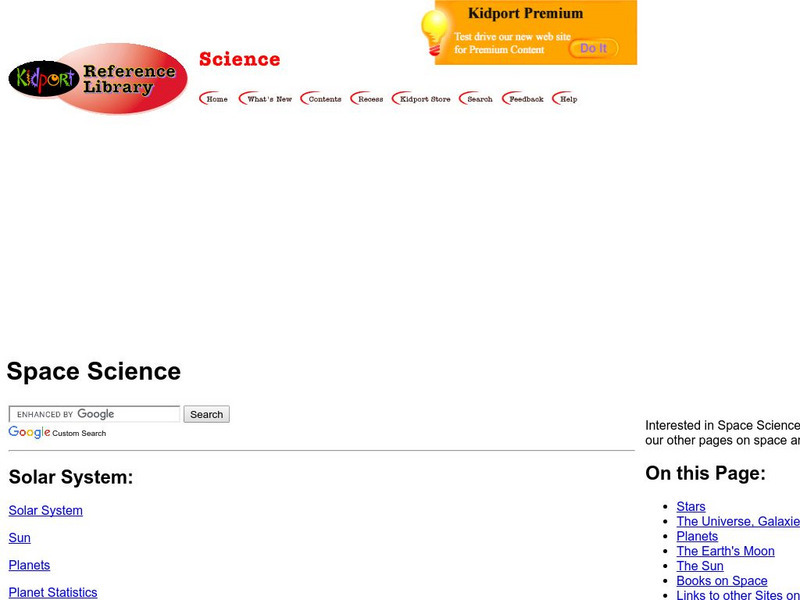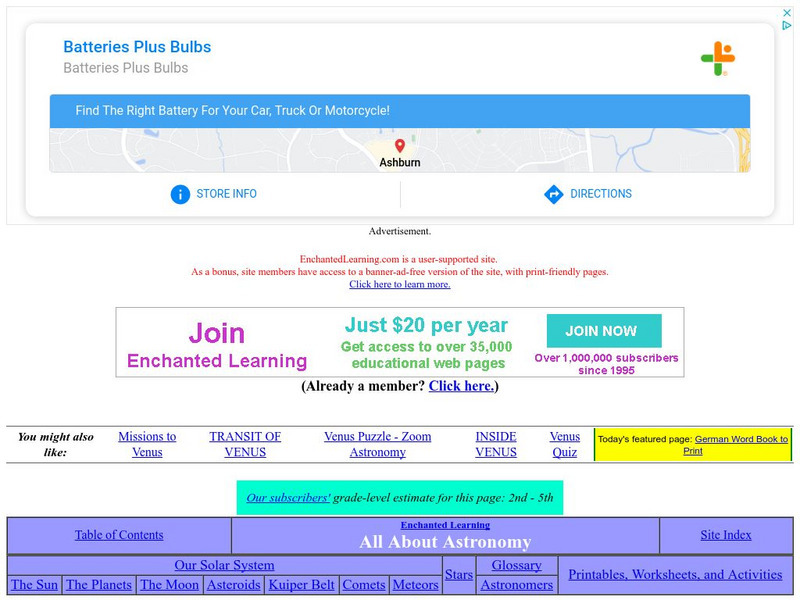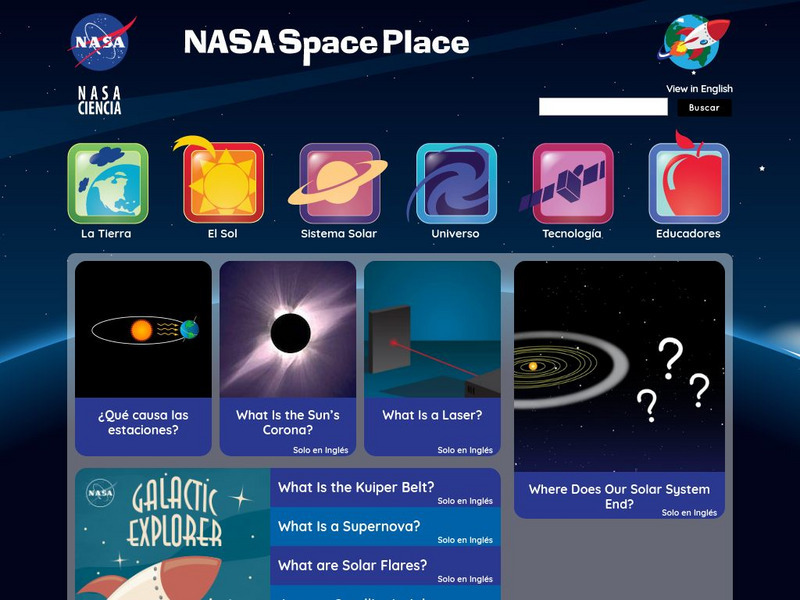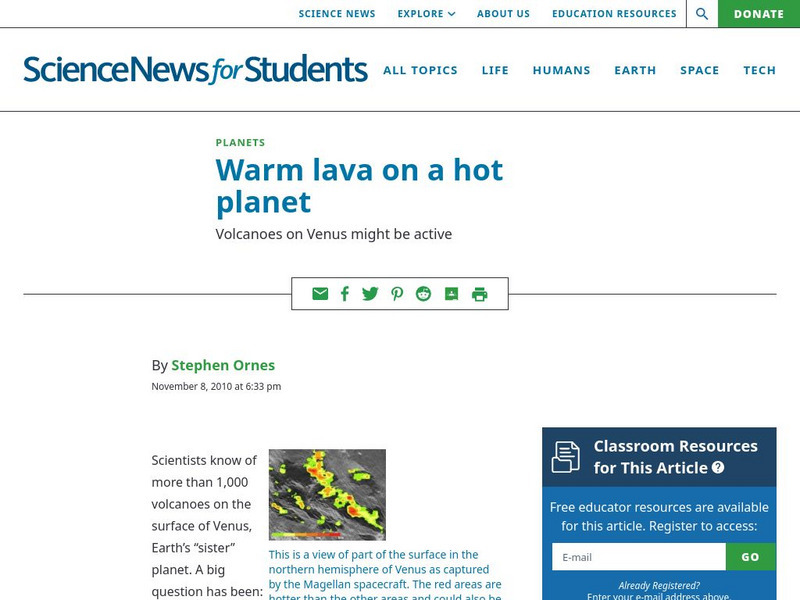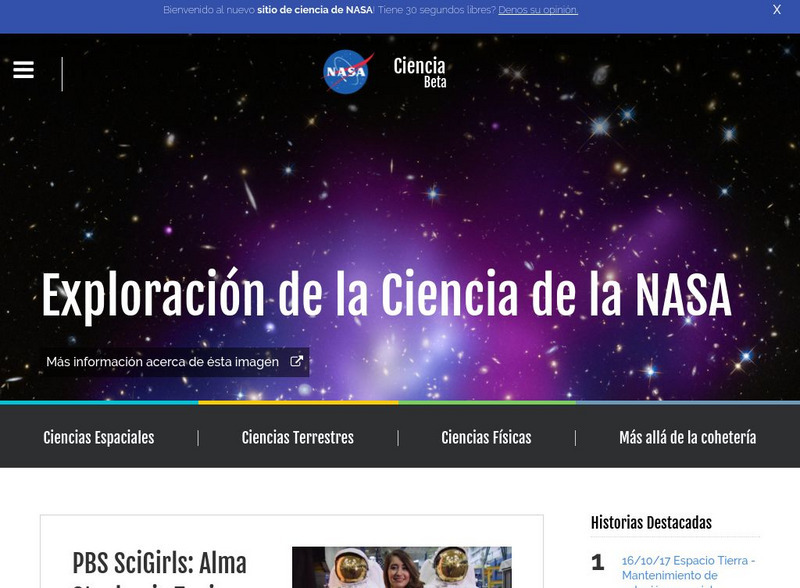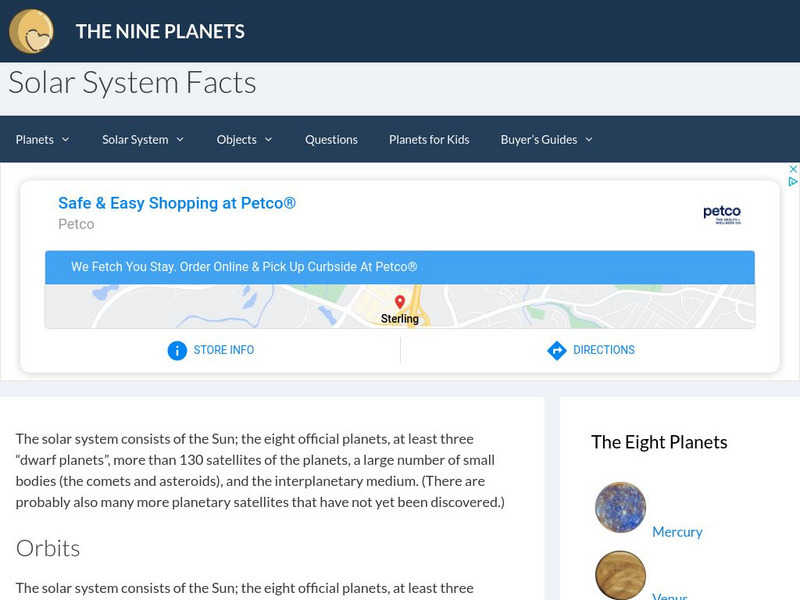Smithsonian Institution
National Air and Space Museum: Exploring the Planets: Venus
Get the facts on Venus. Resource offers a variety of satellite images and facts about the structure and features of Venus.
NASA
Nasa Star Child: Space Probes to Venus
A brief discussion of the space probes that have reached the planet Venus.
Enchanted Learning
Enchanted Learning: Zoom Astronomy: All About Space
A fantastic collection of information about the solar system. Includes information on all of the planets, the moon, the sun, asteroids, comets, meteoroids, and stars. Also find puzzles, a dictionary, quizzes, classroom activities, and...
Seeker
Seeker: Week of 3 17 14: Active Volcanoes Revealed on Venus
Active volcanoes have been discovered on the planet Venus. Learn what this means about our understanding of this planet.
European Space Agency
European Space Agency: Esa Kids: Our Universe: Venus
A basic overview of the planet Venus. Links to information about the other planets and objects in the solar system are included.
California Institute of Technology
Cool Cosmos: Ask an Astronomer: Venus
Resource offers the answers to many frequently asked questions about Venus. Kids can click on the user-friendly question links to learn more about this amazing planet.
Smithsonian Institution
National Air and Space Museum: Exploring the Planets: Our Solar System
Take a tour of our solar system and learn fascinating details and observations about the planets.
Kidport
Kidport: Space Science
This complete resource will help students to improve their understand of space exploration. Includes images of the universe, galaxies, stars and planets.
Enchanted Learning
Enchanted Learning: All About Space: Venus
All About Space profiles the planet Venus with information about its size, mass, atmosphere, length of day, and the like. Features include interactive activities and learning exercises.
NASA
Nasa Space Place: El Space Place
NASA's space science site for kids - en Espanol. Features a wide range of activities, including games, projects, animations, and more. Also contains useful information on basic physics, chemistry, and other natural sciences, offering...
NASA
Nasa: Image Science Center: Ask the Space Scientist
A NASA scientist, Dr. Sten Odenwald, answers many students' questions. Topics include planets, galaxies, black holes, the origin of the universe, and common misconceptions about space.
Society for Science and the Public
Science News for Students: Warm Lava on a Hot Planet
Describes scientific research into volcanic activity on the surface of Venus. Using information transmitted from the orbiting Magellan spacecraft, data is collected. Includes a glossary of vocabulary terms. [ November 8, 2010]
Smithsonian Institution
National Air and Space Museum: Exploring the Planets: Ancient Times & the Greeks
In ancient times only five planets were known: Mercury, Venus, Mars, Jupiter, and Saturn. Learn about Greek astronomer Ptolemy's theory for the solar system that was to survive for fourteen centuries.
A&E Television
History.com: The Space Race: Interactive Universe
A virtual journey through space offers photos and facts about Earth and its neighboring planets, comets, other celestial bodies of the Solar System, and the Milky Way and Andromeda galaxies.
PBS
Pbs Learning Media: The Planets of the Solar System
As technology has advanced, so do our views and understanding of the solar system. No longer do we have to rely on our unaided eyes to observe planets. View these high-quality images of planets provided by NASA spacecraft.
NASA
Nasa: Planetary Data Sytem: Welcome to the Planets
Collection of images, with vocalized explanatory captions, of the planets acquired by NASA as part of its exploratory space programs.
CK-12 Foundation
Ck 12: Earth Science: Planets in Our Solar System Study Guide
A quick overview of the eight planets in our solar system.
NASA
Nasa: La Historia De Hoy: Today's History (Spanish)
Explore the depths of space and science comprehensive information about the meteor showers in 2004, the transit of Venus, virtual reality, and other interesting science history.
TeachEngineering
Teach Engineering: Mercury and Venus
Students explore Mercury and Venus, the first and second planets nearest the Sun. They learn about the planets' characteristics, including their differences from Earth. Students also learn how engineers are involved in the study of...
NASA
Nasa: Magellan Mission to Venus
This home page from NASA offers Venus images taken by Magellan and other highlights from the mission. In orbit around Venus for four years this mission provided maps of 98 percent of the surface of Venus that are more detailed than most...
NASA
Nasa: Space Place: Messenger: Planet Mass Comparison
Compare the masses of planets in this interactive animation. Simply pile a number of Earths on one side of the scale, to balance with the mass of one Jupiter. Then try this with all the planets.
Nine Planets
The Nine Planets: An Overview of the Solar System
A detailed overview of the history, mythology, and current scientific knowledge of each of the planets and moons in the solar system.
TeachEngineering
Teach Engineering: Spacecraft Design: Beat the Heat
To understand the challenges of satellite construction, student teams design and create model spacecraft to protect vital components from the harsh conditions found on Mercury and Venus. They use slices of butter in plastic eggs to...







